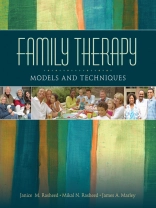This text offers a straightforward, comprehensive overview of both traditional and evolving theoretical models of family therapy and intervention techniques as well as a discussion of clinical issues unique to family therapy practice. Aiming to prepare students to develop beginning proficiency in family therapy, the authors outline major family therapy models in detail, including a step by step description of concepts, theories, skills, and techniques as well as a history of each model and its conceptual and theoretical underpinnings. The text also provides extensive case illustrations of family interviews that identify the specific stages, clinical issues, concepts, theories and techniques associated with each model.
This core text is designed for graduate level courses such as Family Therapy, Marriage and Family Therapy, Marriage and Family Counseling, Family Systems Theory, and Family Counseling in departments of social work, psychology, nursing, education, or human services.
İçerik tablosu
PART I: Introduction and Background
1. The History of Family Therapy: Conceptual and Clinical Influences
2. The Ecology of Families: A Systems/Developmental Perspective
3. Ethnicity and Family Life
Part II: Models of Family Therapy
4. Communications/Humanistic Family Therapy
5. Family of Origin Family Therapy
6. Structural Family Therapy
7. Strategic Family Therapy
8. Solution-Focused Family Therapy
9. Cognitive-Behavioral Family Therapy
10. Narrative Family Therapy
Part III: Clinical Issues in Family Therapy
11. Phases of Family Therapy
12. Families in Transition: Alternative Family Patterns
13. Family Stress, Crisis, and Trauma: Building Family Resilience
14. Family Therapy Research: Implications for the Practicing Family Therapist
AAMFT Code of Ethics
About the Authors
Yazar hakkında
Mikal N. Rasheed is an Associate Professor and Chair of the Justice Studies and Social Work Department at Northeastern Illinois University. He formerly served on the faculties at the George Williams College of Social Work at Aurora University and was also the director of the Department of Social Work at Texas Southern University. He received his Masters degree from the University of Chicago, School of Social Service Administration, and a Doctorate degree in social work from Loyola University Chicago. He is coauthor of two Sage publications, Social Work Practice with African American Men: the invisible presence and Family Therapy with Ethnic Minorities (2003). He has taught courses on family therapy, couple therapy, cross-cultural practice, child welfare practice, generalist social work practice, clinical supervision and clinical practice with men; and conducts workshops and training in these areas. He is a licensed clinical social worker in the state of Illinois and has maintained a (part-time) private practice for more than 20 years in which he specializes in men′s issues, practice with people of color, couple and family therapy.












